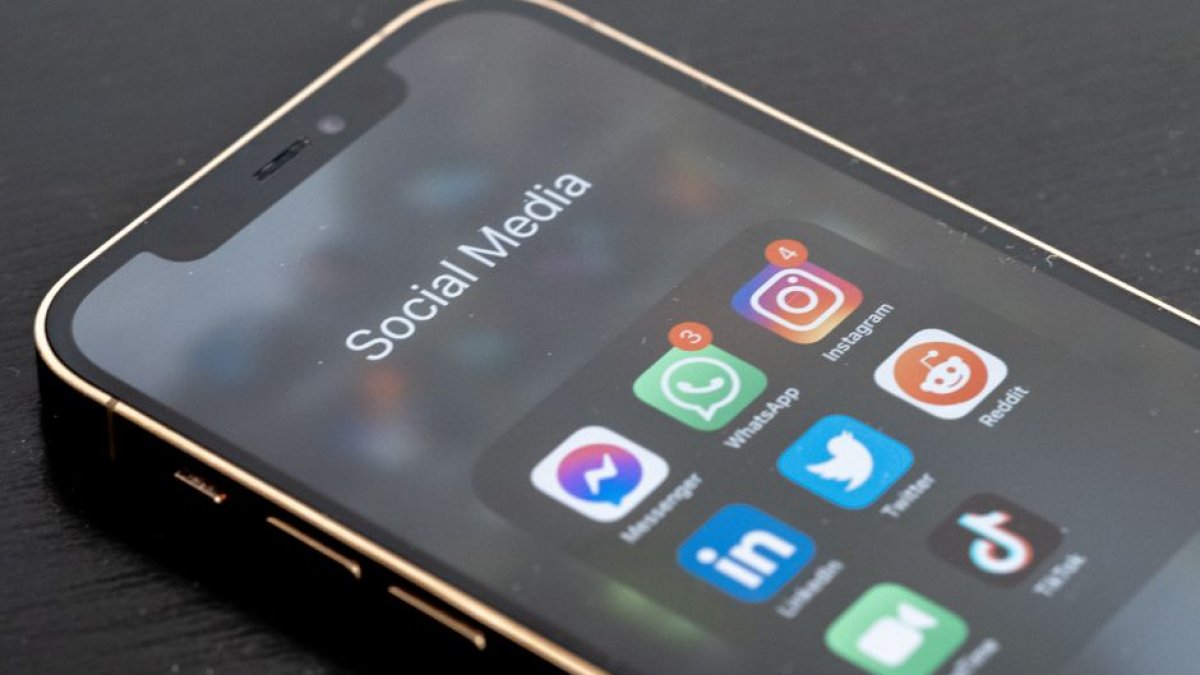Social media platforms are in the spotlight for harming young people's mental health
More and more countries are suing platforms such as TikTok, Facebook and Instagram for fostering addiction among young people with functions such as "infinite scrolling" and allowing videos with "inappropriate content."

(Social Media Apps/ Flickr)
TikTok continues to run into problems. The social network must face the fact that the United States might ban its use in 2025 unless its parent company, ByteDance, sells it to an American buyer. Additionally, TikTok now faces numerous lawsuits alleging the platform harms the mental health of minors, similar to issues seen with other social networks.
It is no secret that functions such as the "infinite scroll" or the controversial "For You" page are designed to keep users, including minors, engaged for as long as possible. These hyper-personalized mechanisms particularly affect young people. According to a Pew Research Center study from last March, 17% of surveyed minors reported using TikTok "almost constantly."
Its reputation in the United States is not good either. According to a study conducted by Axios Harris Poll 100, more and more citizens view the company with bad eyes and, if in 2020, it had a "fair" reputation, the poll conducted this year states that its reputation in this 2024 is "poor."
However, the primary concern is not the frequency of young users' access to the Chinese social networking platform or on the company's reputation as a U.S. company, but the content they encounter. A study by the Center for Countering Digital Hate found that inappropriate content appears on new TikTok accounts within minutes of scrolling. Videos related to suicide surfaced every 2.6 minutes while content related to eating disorders appeared every eight minutes.
Seattle Public Schools vs. Social Media
In January 2023, these findings prompted the first lawsuit against TikTok in the United States. Seattle Public Schools filed a complaint not only against this social network but also against Google, Meta and Snapchat for causing "mental harm" to children.
The district alleged that harmful online content was directed at students, leading to an increase in mental health crises and behavioral disorders. They claim that these different social networks not only allow but promote such harmful content.
Arkansas calls TikTok a 'Trojan horse'
Two months later, Arkansas officials joined the lawsuit. The state, backed by Governor Sarah Huckabee Sanders, also sued Meta and TikTok for "deceiving younger users," going so far as to claim that the Chinese social network was nothing more than a "Trojan horse":
These practices mainly affect the youngest users. According to the lawsuit, "tens of millions of minors use TikTok in the United States" without realizing the dangers to which they are exposed. Similar warnings have been issued by the government of Arkansas:
Utah accuses the Chinese social network of 'inciting' and attracting minors to consume content that is harmful to them
In October 2023, Utah joined the growing number of states concerned about how TikTok affects young people's mental health. Governor Spencer Cox and Attorney General Sean Reyes filed a lawsuit in Salt Lake City court against the platform. In it, they alleged that the social network attracted children and encouraged them to spend hours on the app. Governor Cox said, in statements reported by the AP, that this is something they were not willing to tolerate:
According to Utah's lawsuit, the social network's strategy of attracting minors to spend excessive hours on the app raises serious concerns about young people's health.
The lawsuit revealed that children who spend more than three hours a day on social media, whether TikTok, Facebook, X (formerly Twitter) or Instagram, double their risk of "suffering from mental health problems, including anxiety and depression." However, the situation is particularly concerning with TikTok. Attorney General Sean Reyes explained to Reuters that the impact on mental health is even more severe with the Chinese social network:
Attorneys general in 33 states are suiting Meta for spreading content with "addictive effects"
The same month that Utah sued TikTok, attorneys general from up to 33 states filed a lawsuit against Meta in a California court. They accused the tech giant of distributing content and applications with addictive effects on minors. Additionally, the lawsuit alleged that Meta collected data about minors without parental knowledge or consent, which is illegal under federal law.
The attorneys general emphasized that Meta's practices significantly harm the mental health of young people, especially teenagers. The lawsuit argued that Meta's algorithms and user-friendly content search systems are designed to expose young users to content that fosters false beliefs and reinforces their insecurities.
The "infinite scroll" was, again, a cause for concern. According to the attorneys general, this mechanism causes users to remain hooked to the app almost constantly. Additionally, the plaintiffs expressed concern about the broader effects of social media use. They claimed that photo filters and the emphasis on "likes" had led to an increase in social comparison and the promotion of body dysmorphia.
Florida is going to war against social networks
In January 2024, Florida formally went to war against all social networks. The state House of Representatives approved HB 1, a bill that restricts access to social networks for those under the age of 16 without specifying which platforms are banned.
The initiative, which will require companies to delete all profiles suspected of being controlled by minors, passed with the support of the Republican caucus and some Democratic legislators with 106 votes in favor and 13 against.
The bill's Republican sponsors argued that social networks are a tool that aids harassers and child sexual predators and can cause serious mental health issues such as depression and addiction. However, opponents contended that the ban violates the First Amendment and that it should be up to parents to decide what their children can and cannot do.
New York accuses social networks of intentionally fostering addiction
In February 2024, New York Mayor Eric Adams joined the growing trend of blaming social media for fostering addiction among young people. Mayor Adams filed a lawsuit in the Superior Court of California against major social media companies including Facebook, Instagram, Snapchat, TikTok and YouTube. The lawsuit alleges that these platforms intentionally promote addiction and contribute to mental health issues in minors.
"Over the past decade, we have seen just how addictive and overwhelming the online world can be, exposing our children to a non-stop stream of harmful content and fueling our national youth mental health crisis," Adams alleged.
The mayor emphasized that this lawsuit represents a "bold action on behalf of millions of New Yorkers to hold these companies accountable for their role in this crisis" and "a larger reckoning that will shape the lives of our young people, our city, and our society for years to come."
Nebraska, the latest state to sue TikTok for causing mental health problems
In May of this year, Nebraska joined multiple states suing in TikTok, alleging addiction and its role in "fueling a youth mental health crisis." The 82-page brief, filed in Lancaster County District Court, accuses the company of deceiving teenage users and their parents by falsely claiming to have implemented security measures to shield young people from inappropriate content.
After two years of research, Attorney General Mike Hilgers issued a statement saying that they confirmed that TikTok shows minors "inappropriate content" ranging from videos that promote body image problems to other more serious topics such as suicide:
The European Union opens an investigation against TikTok
As investigations into TikTok's practices multiplied across the country, the European Union also joined in and also announced that it was launching formal investigations against the Chinese social network in February 2024.
That month, the European Commission, the EU's executive body, revealed suspicions that TikTok was violating its digital policies. Specifically, the Commission outlined concerns regarding breaches of laws protecting minors, transparency, data protection, risks of addiction and harmful content.
Once again, addiction became a focal point of discussion, with the European Union claiming that there were "real and foreseeable effects" detrimental to the "physical and mental well-being of the person," posing a risk to European citizens.
The European Commission has identified multiple concerns beyond the algorithm's impact on individuals' health. Transparency issues and third-party access to user data are also flagged. Additionally, TikTok allegedly falls short in ensuring sufficient privacy, security and protection for minors. This includes inadequate default settings for minors within the design and operation of its recommendation systems.
The EU extends its investigation into other social networks such as Facebook and Instagram
Three months after launching an investigation against TikTok, the European Union initiated another formal investigation, this time targeting Meta, which operates Facebook and Instagram, over concerns about fostering addiction among minors.
Thierry Breton, Commissioner for the Internal Market, announced the decision of the EU's highest body. "We are not convinced that Meta has done enough to comply with the Digital Services Act (DSA) obligations - to mitigate the risks of negative effects to the physical and mental health of young Europeans on its platforms Facebook and Instagram," he posted on social media.
Breton specified three key points that prompted the EU's investigation: "The potential addictive and rabbit-hole effects of the platforms; the effectiveness of their age verification tools; and the level of privacy afforded to minors in the functioning of recommender systems."
The European Union's investigation into TikTok Lite prompted the Chinese social network to suspend that particular version
In April, the European Union announced that it was opening an investigation against TikTok Lite. The simplified version of the social network, available only in Spain and France, raised concerns for the European Commission regarding its practice of offering financial compensation for viewing content.
This program awards Amazon and PayPal gift cards to users simply for viewing exclusive videos, following certain content creators, and inviting other users to use TikTok Lite.
Thierry Breton, the Internal Market Commissioner, warned in a press release that the program could "be as toxic and addictive as "light" cigarettes:
Given this, TikTok announced, just a week later, that it was suspending that particular version and that TikTok Lite would no longer be available.
Nepal bans TikTok for putting 'social harmony' at risk
Although the United States has been at war with TikTok for years, the government of Nepal took a decisive step by imposing a nationwide ban on the platform. In November 2023, Narayan Prakash Saud, the Nepalese Minister of Foreign Affairs, declared that he was banning the Chinese social network. He claimed that TikTok disrupts public order as well as "disturbs social harmony":
Following the initial announcement, Nepal's Minister of Communication and Information Technology, Rekha Sharma, further justified the ban by accusing TikTok of being a platform for the dissemination of "malicious content." Sharma emphasized that the ban would go into effect immediately. "The ban will come into effect immediately and telecom authorities have been directed to implement the decision," said the Nepalese minister.
























